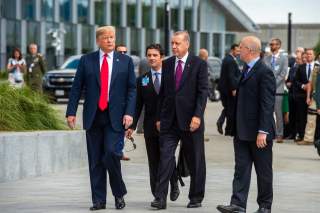Trump's Strategy to Get NATO to Spend More Is Working—but Will It in the Long Run?
Trump may be exchanging long-term stability for short-term gain.
And what exactly would a better deal on NATO look like for Trump? Importantly, a strategic rationality approach assumes that an actor has a clear picture of his goals and the end game. But Trump has not established clear and achievable goals for the other NATO allies to meet. Is 2 percent sufficient? More? What rewards do those who reach that benchmark receive, and what penalties do “noncompliers” get? When must this be accomplished by, and can allies substitute certain spending metrics (e.g., purchases of American military hardware) in place of the benchmark? Trump and his administration have been silent about these questions, even as they publicly “name and shame” European countries for non-compliance.
Careful, consistent policy advisors could fill in these details, translating the productive portion of Trump’s threats into sustained security efforts by Europe and Canada and without damaging long-term alliance cohesion. For instance, Elizabeth Saunders of George Washington University has highlighted how experienced advisors to inexperienced presidents have greater power and authority. Furthermore, reports indicated that Tillerson, Mattis, and McMaster—all of whom have publicly supported NATO—have restrained Trump’s worst foreign policy instincts. But Tillerson is gone, Mattis is weakened, and Bolton (who shares Trump’s hostility toward international institutions) has replaced McMaster. This further increases Trump’s negotiating leverage, but should also increase European fears of abandonment. So buckle up: the Trans-Atlantic relationship is set to get even rockier.
Raymond Kuo is an assistant professor of Political Science at Fordham University.
Image: U.S. President Donald Trump checks time prior to a dinner at the Art and History Museum at the Parc du Cinquantenaire during the NATO Summit in Brussels, Belgium July 11, 2018. Geert Vanden Wijngaert/Pool via REUTER

